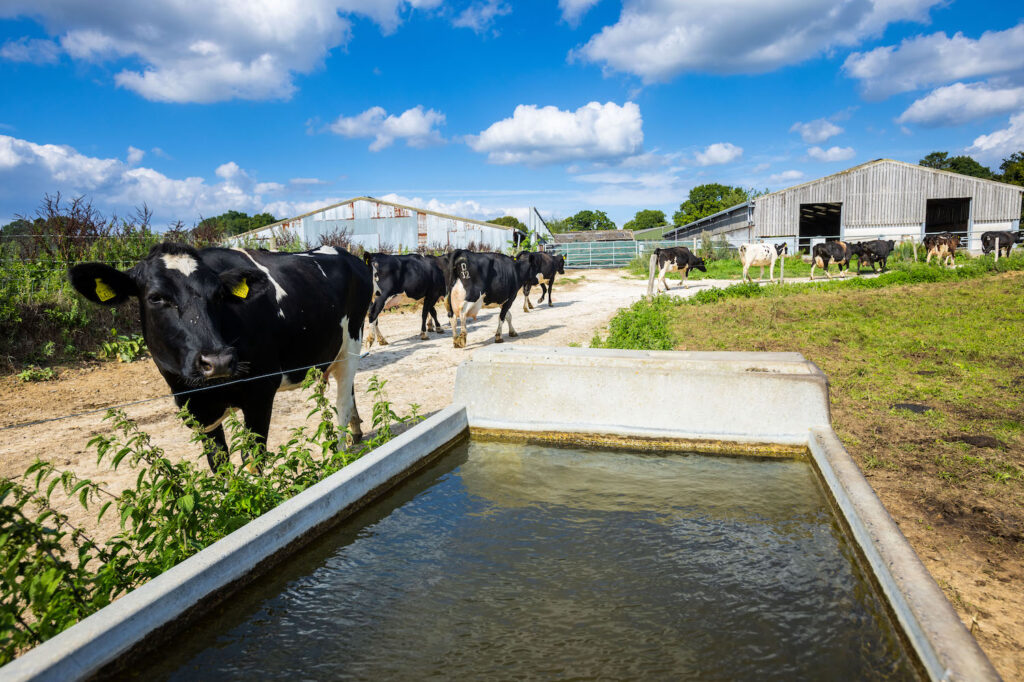Funding and support on offer to help farmers prepare for future droughts
6th September 2022
South East Water is offering farmers in the region funding and support to help increase their farm’s resilience to future droughts.

Cockhaise Farm, Haywards Heath, where South East Water have helped install rain harvesting systems including an underground tank and control panel, concrete sleepers, and hedgerows.
South East England has seen some of the hottest and driest months since records began in 1836, and the lowest rainfall since 1911. With the Met Office predicting summers to be 1-6°C warmer and up to 60% drier by 2070, farmers are encouraged to take advantage of available support to help prepare for water shortages.
According to Al Stewart, surface water lead at South East Water, the company’s two reservoirs in Arlington, East Sussex, and Ardingly, West Sussex, are only 48% and 31% full at present – down from 91% and 97% this time last year.
“We’re therefore encouraging households and businesses to do their bit to make sure there’s enough for life’s essentials, such as bathing, hydration, and food production,” Mr Stewart said.
South East Water currently supplies 2.3 million customers with quality drinking water, delivering over 520 million litres of water each day. The company draws water from six rivers, six reservoirs, and more than 250 boreholes, which is then treated at one of their 87 treatment works.
To help support the farming community during these critical times, South East Water is offering free on-farm audits that give farmers a detailed insight into their current water usage. They also offer advice on the steps farmers can take to level up the water management system on their premises.
An efficient way of cutting down water usage on farms is by installing a rainwater harvesting system. South East Water is currently offering funding up to £10,000 to help with installation costs.
“Costs have previously been a barrier to farm businesses fitting this type of equipment, but we’ve seen an increased appetite from farmers, in particular livestock producers, who are looking to create a level of self-sufficiency,” Mr Stewart explained.
For those looking to take more immediate action to minimise unnecessary water use, Tom Brassington, ADAS agricultural engineer, has some practical tips and advice.
“Keeping milking parlours clean and hygienic by washing down equipment and surfaces at least twice a day is key for dairy farmers. However, there are steps that can be taken to try and reduce water usage during this process,” he says.
Mr Brassington recommends farmers consider whether the whole collecting yard needs to be washed down and if a low volume washer could be used instead of a high-volume option. Scraping and brushing surfaces clean before washing down can also help reduce water use.
“Wherever possible, try to reduce and recycle water. This could include using water from plate coolers to provide drinking water to the cows, or for cleaning down equipment.”
An easy way to reduce unnecessary water use is to check all areas of the farm for burst water pipes, particularly around joints. As Mr Brassington pointed out, this issue can often go unnoticed due to the pipes being buried underground.
“Shutting the supply off to valves in areas that aren’t in use and having water meters fitted on each individual supply to help to monitor for leaks can also help,” he said.
Last but not least, Mr Brassington recommends checking ballcock valves on drinking troughs to make sure water is not overflowing. Tightening the valves so troughs don’t fill up to the rim can also prevent cows spilling water when drinking and reduce wastage.
To discover upcoming events and workshops run by South East Water to support farmers and landowners, visit: https://www.eventbrite.com/cc/supporting-farmers-1095269
